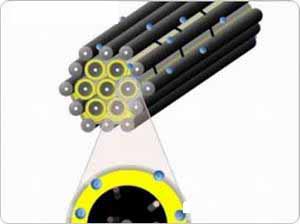Lithium-sulfur battery is a kind of sustainable high specific energy secondary battery. It has many advantages such as rich element reserves and low cost. It is a research hotspot of electric vehicle battery. At present, the international technical level of lithium-sulfur batteries is approximately 350 Wh/kg. To this end, the goal of lithium-sulfur battery research and development is that by 2016, the lithium-sulfur battery has an energy density of 400-600 Wh/kg, which is expected to drive the battery-driven electric vehicle to exceed 500 kilometers. According to industry experts, the specific energy density of the secondary battery system composed of elemental sulfur as a lithium-sulfur secondary battery positive electrode material and metallic lithium can reach 2600 Wh/kg, which is a commercial lithium cobalt oxide/graphite lithium ion battery (theoretical energy density 360 Wh/ 7 times of kg); At the same time, the elemental sulfur is low in price, rich in production, safe and non-toxic, and environment-friendly, so the lithium-sulfur battery is considered to be a new generation of batteries with promising development.
High Precision Machining is defined as a process of changing the dimensions or the performance of workpiece with machining facilities.
According to the temperature of the workpiece while in machining, high precision machining can be divided into cold working and hot working. Usually, machining under indoor temperature, and won't change cause chemical change or phisical phase change is named cold working. On the other hand, if under temperature, higher or lower than room temperature, which will lead to chemical changes or phase changes, it will be called as hot working.
For high precision machining, the machining tolerance can be up to 0.0001-0.001mm, the surface finish Ra can be 0.02-0.1um.
Machining precision is to describe the actual geometrical parameter of the part after machining, such as the size, the form, the position, comparing with the theoretical geometry parameter. The difference from these two parameters is the machining tolerance. The number of the difference show the machining accuracy, the bigger, the lower of the machining precision, the smaller, the higher machining precision.
High Precision Machining,Aluminum Alloy Diecasting,Precision Parts,Machining Parts,Malaysia Zinc Die Casting NINGBO ZHENHAI BOLANG METAL PRODUCT FACTORY , https://www.aldiecastings.com
The Chinese Academy of Sciences successfully developed a rated capacity of 15Ah lithium-sulfur battery
Recently, Professor Chen Jian of the Dalian Institute of Chemical Physics, Chinese Academy of Sciences, led an advanced secondary battery research team to make important progress in high-energy lithium secondary batteries. He has successfully developed a lithium-sulfur battery with a rated capacity of 15 Ah, and has formed a small batch production capacity.